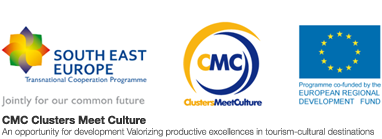Stakeholder’s point of view: interview with János Keresnyei, President, Cultural Creative Industry Cluster (Pécs).
János Keresnyei, besides being the president of Cultural Creative Industry Cluster in Pécs, also participated at the Territorial Product Manager training in Vicenza, in November 2013. Therefore, he was one of the trainers of the “Shopping trainer” courses in Pécs, in February 2014.
According to your experience as president of Cultural Creative Industry Cluster, what are the main beneficiaries of a cluster membership?
Cultural creative enterprises struggle for their mere existence within a very harsh and competitive business environment. These enterprises have to find new ways and methods to sustain and increase their competitive and sustainability capacities. The cluster serves exactly these aims via developing new business models by incorporating and sharing common resources. The cluster has dual aim with these business models: first, the model should be tested and validated by the cluster members, second, the promising business models should be offered for the members as income generating business formulas.
Which are the main obstacles and barriers of clustering, in general?
Personally, I think: the lack of international business skills and poor time management are problems among the majority of the members. And of course, the cluster as a business entity is less familiar for most of the decision makers.
How strong is cultural creative industry in your region? How would you describe it?
Pécs deserved to become the European Capital of Cultural in 2010 for a reason. Since – besides Budapest – this region has the most remarkable and most diverse cultural creative industry accompanied with heritage of the centuries. For example: glove manufacturing, ceramic and porcelain manufacturing, organ instrument building, gold-silversmith workshops, and the seven liberal arts.
How would you characterise tourism in your region and what development potentials can you see?
The CMC project has a great awareness raising power in the field of tourism, because the touristic organisations are able to discover the hidden values of the creative cultural industry traditions. Thus it boosts the linking process of the CCI and tourism. We have great expectations towards the project.
How did you find the Territorial Product Manager training in Vincenza, and now the Shopping trainer courses? According to your opinion, is it an appropriate way for the education?
Every change starts with a paradigm shift. The cross-sectorial synergies can be discovered through out-of-the-box thinking. The main result of the Vicenza training was the emergence of a new mind-set. We believe that the Shopping trainer courses were successfully adopted and advanced according to our local characteristics, and successfully delegated to the local training. According to feedbacks, the regional trends will converge with our forecasts.

